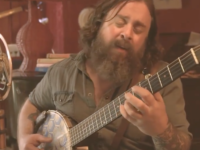Sometimes it seems that popular music does nothing more than go through an endless cycle. It starts with the rise in popularity of some fresh new artist or sound. Next, the industry moves in, takes control, and pursues its music for profit agenda. Finally, the audience gets disconnected from the good stuff and gets stuck with limp, watered-down dreck, while they wait for the new next big thing to blow out the previous one. Wash. Rinse. Repeat.
Such was the state of the nation in the early ’90s when grunge (sometimes called “the Seattle sound”) became a driving force in rock music. A quick thumbnail description might say that the sound of grunge was characterized by a mixing of punk and heavy metal, colored with subversive pop conventions. During the heyday of grunge, many Seattle area bands like Nirvana, Pearl Jam and Soundgarden made the jump from being local performers to the big time.
But by the middle of the decade, the industry left Seattle to look for greener pastures and greener dollars. One such musical act that found itself abandoned was Screaming Trees, a band from further inland Washington state. They had released four indie label albums in the late ’80s, and in 1991 they released the first of their three major label recordings — just in time to ride the grunge wave about to sweep the nation.
Unfortunately, like many others, they too went down for the count a few years later. They tried to press on: In 1999, Screaming Trees even had an album in the works, but as no record label showed interest in releasing it, they finally called it a day.
However, in 2011 that album eventually surfaced on Sunyata Records, owned by former Screaming Trees drummer Barrett Martin. The aptly titled Last Words: The Final Recordings is actually pretty good — definitely not a collection of studio death rattles often found on these sorts of posthumous releases.
Recorded at the studio of Pearl Jam’s guitarist Stone Gossard, Last Words: The Final Recordings lacks the overproduced sound that characterizes so many artists’ big budget work of the late ‘80s and early ‘90s. Instead, it comes across as a collection of good songs, well played, by a band sounding less concerned about fitting into a genre and more concerned with delivering the songs themselves.
It’s interesting how the music feels connected to the garage rock scene of the Pacific northwest back in the ‘60s in spirit, if not in sound. And a song like Screaming Trees’ “Ash Grey Sunday” could fit easily on a playlist with more contemporary material from the west coast Paisley Underground bands of the ‘80s. By channeling these musical reference points, the album comes across as more timeless than one might have expected and less dated than one might have assumed.
Last Words: The Final Recordings turns out to be a good first place to get acquainted or reacquainted with the sound of Screaming Trees, one of alternative rock’s lesser known talents.
- How David Bowie’s ‘The Next Day’ Stripped Away All of the Artifice - March 15, 2023
- Why Deep Purple’s ‘Who Do We Think We Are?’ Deserves Another Listen - January 11, 2023
- In Defense of the Often-Overlooked Mott the Hoople - November 10, 2022




